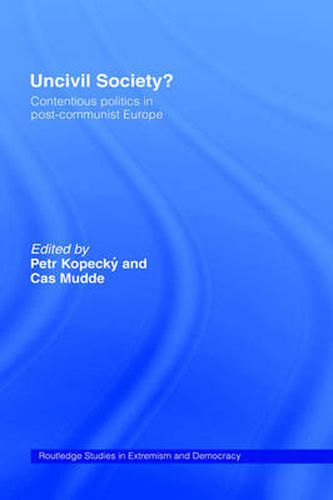Readings Newsletter
Become a Readings Member to make your shopping experience even easier.
Sign in or sign up for free!
You’re not far away from qualifying for FREE standard shipping within Australia
You’ve qualified for FREE standard shipping within Australia
The cart is loading…






Fuelled by the important role opposition movements played in the downfall of communism, most observers expressed initially high hopes for a strong and vibrant civil society in post-communist Eastern Europe. More than a decade after the momentous events of 1989, however, most scholars emphasise civil society’s weakness rather than it’s strength. This volume makes a significant contribution to the debate about the development of post-communist civil society by focusing on its alleged ‘dark side’, i.e on the groups that are excluded from ‘civil society’ on both conceptual and normative grounds. The chapters, written by specialists in the field, explore in rich empirical detail the complexities involved when such groups - like the skinheads in Hungary, the farmers’ ‘Self Defence’ movement in Poland or the war-veterans in Croatia - challenge the state, engage in community activism, or get involved in protest actions. It also offers a contrasting perspective by focusing on similar activities by the alleged ‘pro-democratic’ actors of civil society, such as Impulse 99 in the Czech Republic. The book maintains that political protest, or contentious politics, should be included under a broad and positive development of associational activity in the region. Uncivil Society? Contentious Politics in Post-Communist Europe is a fascinating study, and will be of interest to scholars of Eastern European politics and history.
$9.00 standard shipping within Australia
FREE standard shipping within Australia for orders over $100.00
Express & International shipping calculated at checkout
Fuelled by the important role opposition movements played in the downfall of communism, most observers expressed initially high hopes for a strong and vibrant civil society in post-communist Eastern Europe. More than a decade after the momentous events of 1989, however, most scholars emphasise civil society’s weakness rather than it’s strength. This volume makes a significant contribution to the debate about the development of post-communist civil society by focusing on its alleged ‘dark side’, i.e on the groups that are excluded from ‘civil society’ on both conceptual and normative grounds. The chapters, written by specialists in the field, explore in rich empirical detail the complexities involved when such groups - like the skinheads in Hungary, the farmers’ ‘Self Defence’ movement in Poland or the war-veterans in Croatia - challenge the state, engage in community activism, or get involved in protest actions. It also offers a contrasting perspective by focusing on similar activities by the alleged ‘pro-democratic’ actors of civil society, such as Impulse 99 in the Czech Republic. The book maintains that political protest, or contentious politics, should be included under a broad and positive development of associational activity in the region. Uncivil Society? Contentious Politics in Post-Communist Europe is a fascinating study, and will be of interest to scholars of Eastern European politics and history.